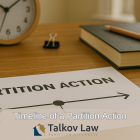San Mateo Real Estate Partition Lawyer
Talkov Law’s attorneys serving San Mateo County are exceptionally experienced in California partition actions and have conducted over 470 for our satisfied clients. California partition actions provide a legal mechanism for co-owners of real property to divide the property among themselves. The partition statutes allow a co-owner to file a lawsuit in court to have the property divided, either physically or by awarding each co-owner a certain percentage of the property’s value. The court will then order the property to be divided according to the co-owners’ wishes. The partition statutes also provide that if the court finds that a physical division of the property is not possible, it may order the property to be sold and the proceeds divided among the co-owners.
Our team of partition attorneys can assist co-owners with frequently asked questions about partitions, such as:
- Can I be forced into selling a jointly owned house? Under California’s Partition of Real Property Act, a co-owner will have a right to buyout the property. However, absent a buy out at the appraised price, a plaintiff will likely be able to force the sale of a jointly owned house.
- Can heirs force the sale of property? Heirs can force the sale of real property in California once that property is distributed to them. However, sometimes, the property is still held in a trust where the trustee will sell the property. When there is no trust, the probate court may decide that the probate administrator will sell the property before it is distributed in fractional interests to the heirs.
- Will there be a trial in a California partition action? Trials are extremely rare in partition actions because the interlocutory judgment procedure allows for a partition referee to be appointed by meeting just a few elements that rarely involve live testimony from witnesses. Even if a trial occurred, it would almost certainly relate only to the ownership interests or the distribution of proceeds, though most cases are decided on motion heard by the court based on the papers submitted by the parties.
- Are there methods to resolve a partition situation without a court-ordered sale? The vast majority of partitions are solved without a court-ordered sale. Many times, the defendant will buy out the plaintiff’s interest. Other times, the parties will agree to a voluntary sale on the open market. However, the filing of the partition action is generally what forces the defendant to see the wisdom of settlement. Under California’s Partition of Real Property Act, a defendant can buy out the interest of the plaintiff at an appraised value, meaning that a court-ordered sale is only likely occur where the defendant simply can’t afford to buy the property but still won’t agree to sell.
- What is California’s Partition of Real Property Act? Effective January 1, 2023, California’s new partition law allows defendants to buy out the interests of the plaintiff at an appraised value.
San Mateo is a city located in the San Francisco Bay Area of California. It is located in San Mateo County, just south of San Francisco and north of Silicon Valley. San Mateo is a vibrant and diverse city that is home to a variety of businesses, including tech companies, financial institutions, and healthcare providers. The city is known for its excellent schools, parks, and recreational activities. San Mateo is also home to a number of cultural attractions, including the San Mateo County History Museum, the San Mateo Japanese Garden, and the San Mateo Performing Arts Center. With its close proximity to San Francisco and Silicon Valley, San Mateo is an ideal place to live, work, and play.
Speak to Our San Mateo Partition Attorneys Today
Call our San Mateo County Partition Attorneys today to end your co-ownership dispute. You don’t pay until the house is sold!
Call us at (650) 999-3300 or contact us below to schedule a free, 15-minute consultation
Goodenow v. Ewer – Partition Action Case Study
In the legal case of Goodenow v. Ewer, 16 Cal. 461 (1860), the California Supreme Court was asked to decide a dispute over the partition of a parcel of land. The dispute arose when the two parties, Goodenow and Ewer, each claimed ownership of the same parcel of land. The court had to determine which party had the right to the land and how to divide it between them. The court held that the land should be divided according to the original survey, with each party receiving an equal share. The court also held that the parties should bear the costs of the partition in proportion to their respective interests in the land. The court’s decision established the principle that when two parties have conflicting claims to the same parcel of land, the court should divide the land according to the original survey and that the parties should bear the costs of the partition in proportion to their respective interests in the land.
Frequently Asked Questions About Partitions in San Mateo
How Much Does a Partition Action Cost in San Mateo?
The costs of a partition action—including attorney fees, court fees, appraiser fees, and other legal expenses—are typically around $20,000. While some cases may incur fees as low as $5,000 or exceed $20,000, depending on their complexity, these expenses are generally shared among the co-owners. The court may also adjust the distribution of these costs based on each party’s level of involvement or responsibility, ensuring a fairer allocation when needed.
Who Can File a Partition Action in San Mateo?
A partition action can be filed by any co-owner of a property, excluding married couples who own it as community property. A majority ownership is not required to initiate a partition action. Common situations for partition actions include disputes among siblings inheriting property, former romantic partners, friends or family members who purchased property together, and divorced couples.
Who Pays for a Partition Action?
In San Mateo, each party typically pays for their own attorney’s fees (known as the “American Rule”). However, California partition law allows for an exception to this rule, stating that “the court shall apportion the costs of partition among the parties in proportion to their interests or make such other apportionment as may be equitable.” California Code of Civil Procedure 874.040. Indeed, the court may award “reasonable attorney’s fees incurred or paid by a party for the common benefit.” California Code of Civil Procedure 874.010(a).
Can a Partition Action Be Stopped in San Mateo?
Generally, a partition action cannot be stopped, but a defendant may be able to buy time to seek a resolution. Eventually, however, the plaintiff can generally force the sale of the property based on the absolute right to partition.
Contact our Team of Experienced Partition Lawyers Serving the City of San Mateo, County of San Mateo, California
Our San Mateo partition litigation attorneys will work diligently to obtain a favorable outcome on your behalf, whether by negotiation or litigation. Talkov Law Partition Attorneys unlocks access to justice for co-owners by funding your case. For qualified cases, you pay no fees until we successfully partition your property by obtaining a sale on the market or to your co-owner! For a free consultation with California’s first and largest team of partition attorneys at Talkov Law, call (650) 999-3300 or contact us online today.































































































































